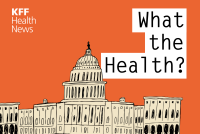Latest California Healthline Stories
Muchas personas mayores aceptan las vacunas con entusiasmo. La investigación les da la razón
Para los adultos mayores que expresan mayor confianza en la seguridad de las vacunas que los grupos más jóvenes, los últimos meses han traído consigo investigaciones muy positivas.
KFF Health News' 'What the Health?': Supreme Court Upholds Bans on Gender-Affirming Care
The Supreme Court this week said Tennessee may continue to enforce its law banning most types of gender-affirming care for minors. The ruling is likely to greenlight similar laws in two dozen states. And the Senate is preparing to vote on a budget reconciliation bill that includes even deeper Medicaid cuts than the House version. Victoria Knight of Axios, Alice Miranda Ollstein of Politico, and Sandhya Raman of CQ Roll Call join KFF Health News’ Julie Rovner to discuss these stories and more.
Federal Proposals Threaten Provider Taxes, Key Source of Medicaid Funding for States
Republican proposals to tighten the use of special taxes to fund Medicaid programs could deprive states of billions of dollars for safety net health care. In California, any such limit would come on top of Medicaid cuts proposed by California Democrats in response to a $12 billion state deficit.
Q&A: What Does the Budget Bill Mean for Your Health?
KFF Health News chief Washington correspondent Julie Rovner answers listeners’ questions about how the “One Big Beautiful Bill” could affect health care in Washington, D.C., and beyond.
With Property Seized and Federal Funding Uncertain, Montana Asbestos Clinic Fights for Its Life
The Center for Asbestos Related Disease in Libby, Montana, closed in May after a court judgment allowing BNSF Railway to seize its assets. Now, the clinic’s federal funding is in jeopardy, too.
Trump Team’s Reworking Delays Billions in Broadband Build-Out
A Trump administration reworking of a $42 billion broadband expansion program will trigger delays as millions of rural Americans wait for promised connections and the telehealth services they bring.
Have Job-Based Health Coverage at 65? You May Still Want To Sign Up for Medicare
Patient advocates say they frequently hear from people who thought they didn’t need to sign up for Medicare when they turned 65 because they had group health coverage. That delay sometimes forces people to cover medical expenses themselves.
An Arm and a Leg: The Prescription Drug Playbook, Part I
In Part 1 of a two-part series on dealing with the high price of prescription drugs, a father explains the strategies he used to get his daughter the medicine she needs to treat her epilepsy.
Nurse Practitioners Critical in Treating Older Adults as Ranks of Geriatricians Shrink
The number of nurse practitioners specializing in geriatrics has more than tripled since 2010.
The Price You Pay for an Obamacare Plan Could Surge Next Year
An estimated 4 million Americans will lose health insurance over the next decade if Congress doesn’t extend enhanced subsidies for Affordable Care Act marketplace coverage, which expire at the end of the year. Florida and Texas would see the biggest losses, in part because they have not expanded Medicaid eligibility.














